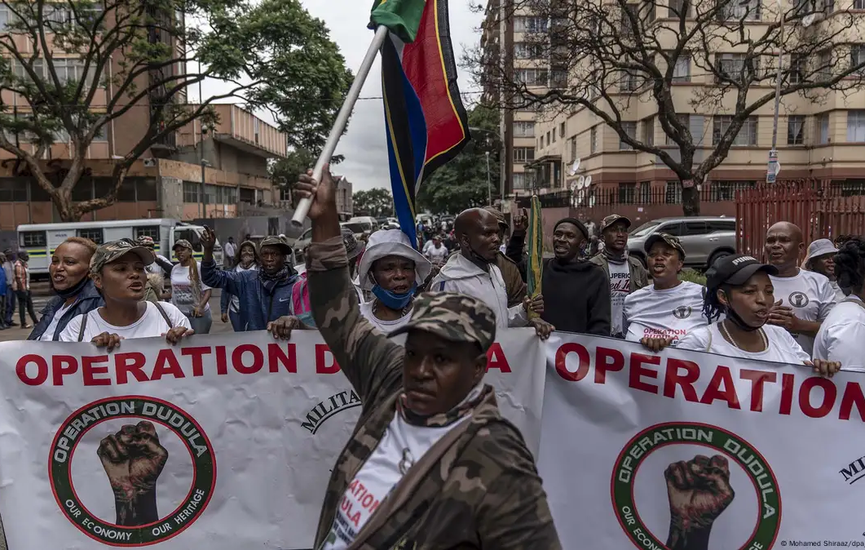Operation Dudula, a controversial anti-immigration movement in South Africa, has intensified its campaign by targeting undocumented migrants’ access to public services, sparking widespread outrage and political condemnation. Originally launched in 2021 in Soweto as a vigilante initiative aimed at curbing crime and drug trafficking, the movement has since evolved into a populist force with a sharply nationalist agenda. Its slogan, “South Africans First,” resonates with segments of the population frustrated by high unemployment, strained public infrastructure, and deepening inequality. In 2023, Operation Dudula registered as a political party, though it did not contest the 2024 elections. That same year, a wave of unrest that claimed over 350 lives further fueled xenophobic sentiment and bolstered the group’s visibility.
In recent months, Operation Dudula has shifted its focus to migrant children’s access to education, delivering letters to schools in Soweto demanding that undocumented foreign nationals be excluded from enrollment in the upcoming academic year. This follows earlier actions where members blocked access to public hospitals, demanding identity documents and turning away foreign patients. These tactics have drawn comparisons to apartheid-era pass laws and have been widely condemned by civil society organizations, legal experts, and political leaders. Critics argue that such actions violate constitutional protections and undermine South Africa’s commitment to human rights and equality.
The Economic Freedom Fighters (EFF), led by Julius Malema, have responded forcefully, filing criminal charges against Operation Dudula and accusing its members of contributing to the death of a one-year-old child whose mother was allegedly denied medical care at a clinic. The EFF described Dudula as a “criminal gang masquerading as a community structure” and warned that denying healthcare to any individual, regardless of nationality, is both illegal and morally indefensible. Gauteng’s Departments of Education and Health have also condemned the movement’s actions, reaffirming that public services must remain accessible to all residents, irrespective of immigration status.
Despite mounting criticism, Operation Dudula continues to expand its operations, emboldened by what many perceive as government inaction. The group’s aggressive tactics, storming clinics, confronting school staff, and conducting identity checks, have created an atmosphere of fear and division in communities already grappling with economic hardship. While Dudula claims to be defending civil rights and prioritizing South African citizens, its actions have been widely interpreted as fueling Afrophobic violence and scapegoating migrants for systemic issues rooted in the country’s apartheid legacy and persistent inequality.
Experts warn that xenophobia remains deeply embedded in South African society, where competition for limited resources often pits locals against foreign nationals. Migrants, particularly from other African countries, are frequently blamed for unemployment, crime, and overburdened public services, despite the fact that many sectors of the economy rely heavily on migrant labor. Operation Dudula has tapped into these frustrations, amplifying them through populist rhetoric and vigilante-style enforcement, raising concerns about the erosion of democratic norms and the rule of law.
As tensions escalate, the need for decisive government intervention and inclusive policy becomes increasingly urgent. Without a clear and coordinated response, movements like Operation Dudula risk deepening social divisions and undermining South Africa’s constitutional values. The challenge lies not only in curbing xenophobic violence but in addressing the root causes of economic despair and inequality that fuel such movements. Only through inclusive dialogue, equitable development, and a reaffirmation of human rights can South Africa hope to navigate this volatile chapter in its democratic journey.
